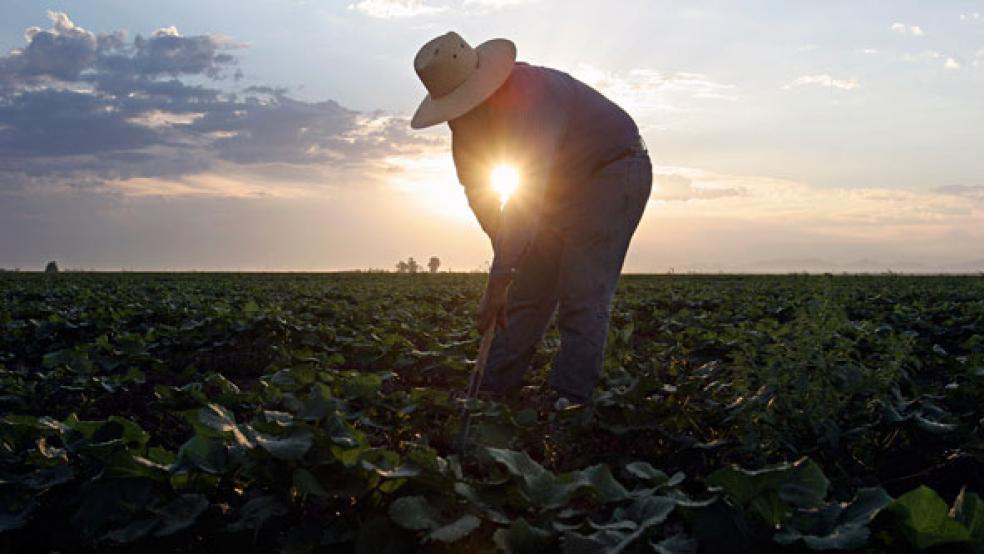At the end of a day of driving around Phoenix in his battered Ford truck scavenging for boxes, Mexican day laborer Jesus Aquilar sells the load to a recycler for pennies a pound, and tosses the yellow receipt with others on his dashboard.

Now that President Barack Obama and the U.S. Congress have begun a push for comprehensive immigration reform, he wants to ensure he will benefit. When the time comes – if it does – to apply for legal status, the stash of dog-eared receipts could be a paper trail to a hoped-for life out of the shadows.
"It's to show them that you are doing the impossible to survive ... and show them that you are doing the decent thing," said Aguilar, speaking in Spanish. "I am here in this country to contribute."
Aguilar is among millions of illegal immigrants at the sharp end of a daily battle for survival on the margins of American society as Obama pushes for immigration reform in Washington, months after Hispanic voters turned out to give the Democrat a second term.
RELATED: 21 Surprising Facts About Illegal Immigration
Obama wants Congress to send him a bill tightening border security and giving many of the 11 million unauthorized immigrants like Aguilar a shot at citizenship, provided they pay fines, back taxes, learn English and wait in line. Bipartisan groups of lawmakers are said to be nearing completion of draft bills in both houses of Congress, and leading senators have said the goal is to introduce a bill by early April. If things go as planned, the legislation could be ready for Senate floor debate by June or July.
For Aguilar, 54, and a father of six, the reform could end the storm over illegal immigration in Arizona - the southwest border state that pioneered a backlash against undocumented workers three years ago - and bring him new security.
A former police sergeant in Ciudad Juarez, the Mexican industrial powerhouse south of El Paso, Texas, Aguilar fled to the United States after several fellow officers were snatched by drug cartel assassins. After crossing the U.S. border legally over a decade ago, he never left, joining a then-booming shadow workforce.
RELATED: Hispanics Now Closing the Digital Divide
When the U.S. economy was soaring mid-decade, he was among 70 to 100 Mexican and Central Americans who turned up each day at the Macehualli Day Labor Center, the only city-sanctioned work site in Phoenix, where they could make as much as $150 a day in construction, landscaping and removal work. Then came the backlash from anti-illegal immigration activists and sweeps for the undocumented by a tough local sheriff, Joe Arpaio. The response culminated in a 2010 state law that required police to question those they stopped, and suspected of being in the country illegally, about their immigration status.
"There was a lot of work four or five years ago ... but since the anti-immigrant laws started up, the number of people has gone down," said Aguilar, who is among a dwindling number of day laborers who have weathered the crackdown.
IN THE U.S. FOR 'AT LEAST A DECADE'
The U.S. illegal immigrant population includes farm, hotel, restaurant and construction workers, students and others. Almost two-thirds have been in the country for at least a decade, according to research by the Pew Hispanic Center in Washington.
Among the most visible are day laborers like Aguilar who solicit work in U.S. cities. Known as "Don Jesus," he is entrusted each morning with opening the labor site before dawn as the workers arrive and put their names on a list for hire. On one recent morning, he breaks up wooden pallets and sparks up a fire for warmth against the desert chill while he waits to be hired along with a half-dozen other workers perched on scavenged office furniture or standing on the curb.
By 8 a.m., not a single contractor has appeared. Mindful of the need to provide for his family at an apartment he rents nearby for $575 a month, he opts for his regular Plan B: Hunting for cardboard tossed out by local stores. His battered 20-year-old truck needs to be coaxed to life from frequent stalls. On a regular route, he pulls boxes from dumpsters using a tool made from a broom handle and a nail.
He then breaks the boxes down, swiftly stacking and lashing them flat into the back of the truck. Sometimes he also picks up discarded food such as ham, fruit juice and biscuits, which he shares with colleagues at the day labor site.
A few hours and nearly a dozen stops later, he has the truck loaded high with cardboard and a couple of wooden pallets that he takes to a recycling yard. The fruit of his labor is worth about $50. He has also picked up a tossed Dell computer he believed he could sell. "They say we come here and take their jobs, but it's quite the opposite," he said. "We go out to work whatever the conditions, under the sun or in the freezing cold."
Meanwhile, he lives with uncertainty. He was arrested in a traffic stop in June when he was unable to produce a driver's license. He was released but must appear before an immigration judge this year and fears deportation. "That's the worst-case scenario," he said. "I don't know what awaits me in Mexico. My family is here."
‘THIEVES, MURDERERS'
More than half of U.S. citizens believe most unauthorized immigrants should be deported, according to a Reuters/Ipsos poll released in February. Opponents variously say they take Americans' jobs, drive down wages, and are a drain on benefits.
Opposition to illegal immigration has been strong in Arizona since at least 2005, when Minutemen activists first sat out in lawn chairs in the desert to spot migrants trekking up from Mexico and report them to the Border Patrol, which then made nearly 1,600 arrests a day.
Setting out factors behind the state's 2010 crackdown, Governor Jan Brewer said Washington had failed to "effectively address" illegal immigration. "In Arizona, anger grew with increasing awareness of the spillover violence, increased kidnappings ... and other scourges of drug-and human-trafficking," she said on her website.
Activists also protested at an informal day labor site outside a Phoenix furniture store, and would regularly roll up at the Macehualli site with American flags and placards that workers said read "No illegals." "They called us murderers and thieves," said laborer Raymundo, 39, from Mexico City, who asked that his last name not be used. "The Americans wouldn't take you to work because they would tell them ‘It's illegal to hire these workers, you will be fined.'"
Raymundo, Aguilar and others say they also face persistent pressure from one Phoenix police officer who regularly drives by the day labor site and orders them off the street. The officer, they say, is Hispanic, a fact they find ironic.
RELATED: Hispanic Voters Likely to Double by 2030
"He's Latino, of Mexican descent," said Marcos Lopez, 32, who shares a two-bedroom apartment with five other immigrants to enable him to support his family in Mexico. "He's forgotten his parents and grandparents got here the same way we did, as immigrants."
'THE RIGHT THING TO DO'
By one federal government estimate, nearly a quarter of Arizona's unauthorized population fled in 2010, the year Brewer, a Republican, signed the state's immigration law. Day laborers caught a small break earlier this month when a U.S. appeals court upheld an injunction barring Arizona from enforcing part of its immigration law that prohibits motorists from stopping traffic to pick up workers.
Now that a push for reform is gathering pace in Washington, others at the work site are, like Aguilar, taking steps to create a paper trail that show they have worked and done what they can to pay their dues, as potential citizens-in-waiting. "You have to pay your taxes. Why? Because it's the right thing to do ... If I can't be legal, at least I can do the right thing," said one man who gave his name only as Jose, and says he assiduously files a tax return each year using a temporary taxpayer identification number.
Should a comprehensive overhaul clear Congress and be signed into law by Obama later this year, coming out of the shadows would mean different things to each of them.
"Everyone wants a little bit of paper so that they can go and visit their families in Mexico," said Aguilar, who has not been home to Juarez in a decade.
For Lopez, reform would simply mean a chance to build a decent life out in the open. "For me it would be an end to walking down the street and hiding from the police. And working freely, working well and paying taxes ... and making this country even greater."



